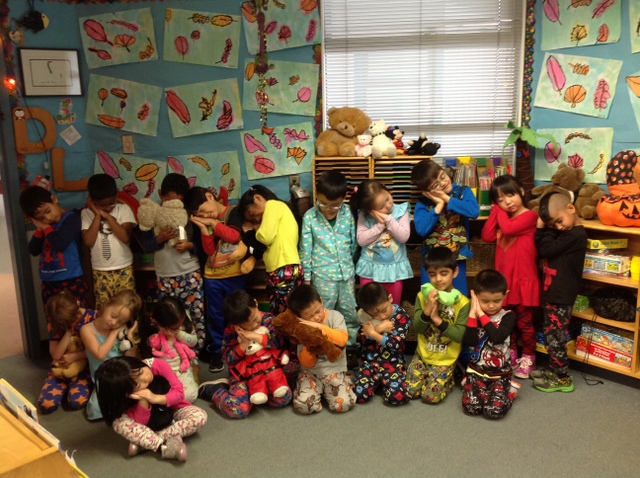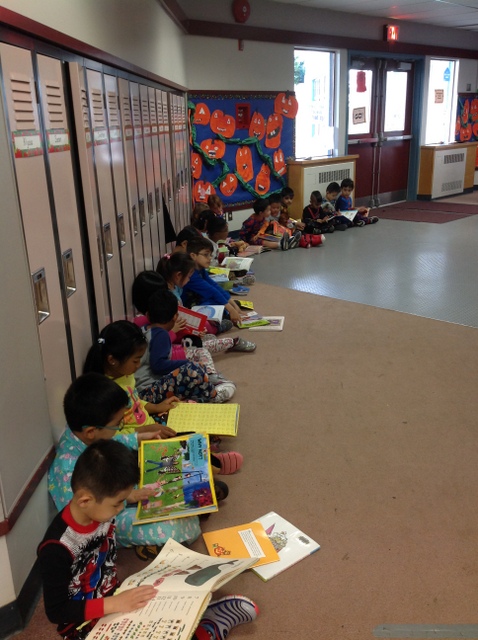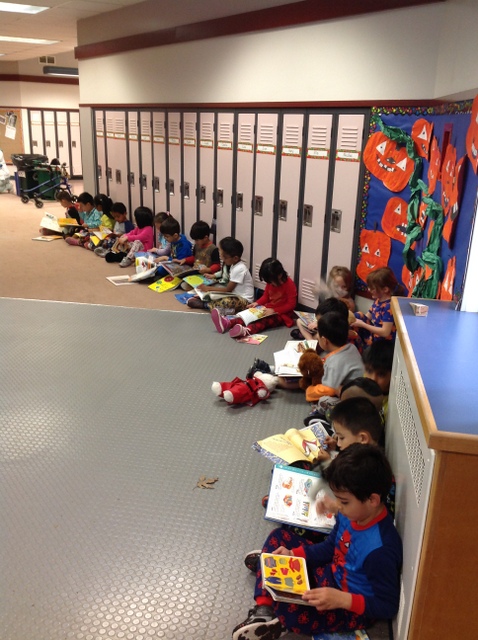Please watch and listen to the video below to see our students’ thoughts about peace and hear the voices of the South Slope Choir. (Turn on your speakers)
Category Archives: 2015
New School Phone Number!!
On November 6th our School phone and fax number will be changing. Please update your phones and notify your emergency contacts so that they are aware.
Phone: 604-296-9062
Fax: 604-296-9063
Pajama Day & Drop Everything & Read!!
How Much Sleep Does A Kindergarten Child Need?
Now that we are entering our fourth week of school, your children are beginning to adjust to the many new routines and activities of a full day Kindergarten program. Did you know that sleep is one of the most important factors in their mood, focus and physical development? A full night’s sleep of 10-12 hours will give your child the stamina to make it through a busy day in Kindergarten!
Have a look at the information below and you may find some helpful tips!
Why does sleep matter?
Scientific evidence shows that the right amount of night-time sleep is just as important for children’s development as healthy eating and regular exercise.
How much sleep does my Kindergarten child need?
A younger child needs more sleep than an older one. Between the ages of five and 11, your child will need 10-12 hours of sleep a night.
Kindergarten children should be in bed by 7:00 or 7:30pm every night!!
Signs of sleep deprivation in school-aged children can include:
- Mood. Sleep deprivation may cause your school-aged child to be moody, irritable, and cranky. In addition, they may have a difficult time regulating their mood, such as by getting frustrated or upset more easily.
- Behavior. School-aged children who do not get enough sleep are more likely to have behavior problems, such as noncompliance and hyperactivity.
- Cognitive ability. Inadequate sleep may result in problems with attention, memory, decision making, reaction time, and creativity, all which are important in school.
How to help your school-aged child sleep well
- Develop a regular sleep schedule. Your child should go to bed and wake up at about the same time each day (7:00-730pm)
- Maintain a consistent bedtime routine. School-aged children continue to benefit from a bedtime routine that is the same every night and includes calm and enjoyable activities. Including one-on-one time with a parent is helpful in maintaining communication with your child and having a clear connection every day.
- Set up a soothing sleep environment. Make sure your child’s bedroom is comfortable, dark, cool, and quiet. A nightlight is fine; a television is not.
- Set limits. If your school-aged child stalls at bedtime, be sure to set clear limits, such as what time lights must be turned off and how many bedtime stories you will read.
- Turn off televisions, computers, and radios. Television viewing, computer-game playing, internet use, and other stimulating activities at bedtime will cause sleep problems.
- Avoid caffeine. Caffeine can be found in sodas, coffee-based products, iced tea, and many other substances.
- Contact your child’s doctor. Speak to your child’s physician if your child has difficulties falling asleep or staying asleep, snores, experiences unusual awakenings, or has sleep problems that are causing disruption during the day.
Terry Fox Run!
Fall Colour Walk to David Grey Park
We are learning about colours in Kindergarten so we decided to take a walk to our neighbourhood park to see how many colours we could find. As Fall (Autumn) is setting in we were able to see lots of beautiful colours! It is such a lovely time of the year.
[metaslider id=908]
Math….we are learning to make patterns!
Today we worked on patterning! We are learning to make simple patterns …. to make it even more interesting, we are making our patterns on fun shapes that have been drawn for us. This is an excellent Math activity for inspiring creativity and developing fine motor skills! Can you think how you might do this at home?
[metaslider id=894]
Mobile Dairy Classroom
We were very lucky to have a visit from the Mobile Dairy Classroom! They brought Buttercup (a 6 year old cow) and Freckles (a one week old calf) to visit us. We learned lots of cool things about Dairy cows and all the things that happen before we drink a glass of milk!
[metaslider id=868]
Kindergarten 2015! See you soon!
The excitement is in the air and Kindergarten is about to begin!! We mailed out our Kindergarten Gradual Entry packages on August 15th. Ms Shuster and I are very much looking forward to meeting all of our new parents and Kindergartens during the first week of school.
If you need a copy of the supply list, please click the Tips & Resources tab at the top of this page.
Enjoy the last days of your summer holiday!
Bye, Bye Butterflies!!
We enjoyed watching our caterpillars as they ate and ate and ATE and got bigger & bigger & BIGGER!! Then they formed chrysalides and emerged as beautiful Painted Lady Butterflies! On Monday, we were very excited to release our butterflies so they could spread their wings and explore our neighbourhood!





